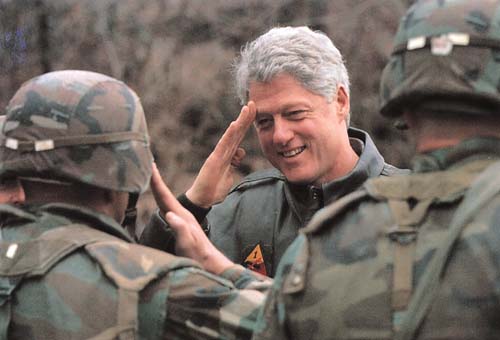
From The Editors, Bloomberg: “NATO hits one tank and then goes away,” lamented a commander of Libya’s opposition forces to the Washington Post. “But NATO could turn this war around in a day if they wanted to.” Muammar Qaddafi, by threatening to launch terrorist attacks against Europe, has given the Obama administration a solid rationale for doing just that. After four months of letting European nations show what they can do, the Obama administration should heed an important lesson from the war in Bosnia and take over leadership of NATO’s air campaign.
“You will regret it, NATO, when the war moves to Europe,” Qaddafi warned Europeans recently. Libyan fighters will “attack your homes, your offices and your families,” he said. Having already killed hundreds in the Pan Am 103 terrorist attack, Qaddafi’s threat is credible enough. President Barack Obama need not wait for the Libyan leader to extend his threats to North America to conclude that what was once a moral intervention to save Libyan civilians is now a national security imperative.
Just as in March, when the White House used Qaddafi’s threat to wipe out the civilian population of Benghazi to justify the original intervention, it can now cite the Libyan leader’s threat of terrorism against the West as a reason to step up U.S. involvement.
Perhaps the biggest obstacle to such a decision is political. Twice this summer, the House of Representatives voted on the war in Libya, and twice it showed bipartisan opposition to even the supporting role the U.S. is playing.
[…]
Today’s political confusion echoes a similar moment in the early days of the previous Democratic president, Bill Clinton. At the time, both parties were internally divided over the question of whether Washington should take the lead from Europe in the effort to prevent Slobodan Milosevic’s Serbs from slaughtering Bosnia’s Muslims in Sarajevo.
Like Obama today, Clinton wanted to focus on the domestic economy and limit U.S. involvement to support for a European-led military operation. Here the parallel gets a little eerie. In trying to justify this stance, a top Clinton official, Undersecretary of State Peter Tarnoff, said the U.S. was “too poor to lead.” That infelicitous explanation haunted the Clinton administration for most of its first two years.
Cut to May of this year, when a senior official in the present administration made a similar remark to the New Yorker. Our strategy to support a European-led operation in Libya, this unnamed official said, amounted to “leading from behind.” And it is this explanation that now dogs the Obama administration.
The administration would do well to remember the key lesson learned from Clinton’s early days. Because of the U.S.’s unique combination of military, economic and political power, along with Europe’s relative weakness, resolving a complex security crisis like the one in Bosnia required U.S. leadership. Europe was unable to muster a decisive response.
Photo: NATO
Image: bill-clinton-bosnia.jpg
